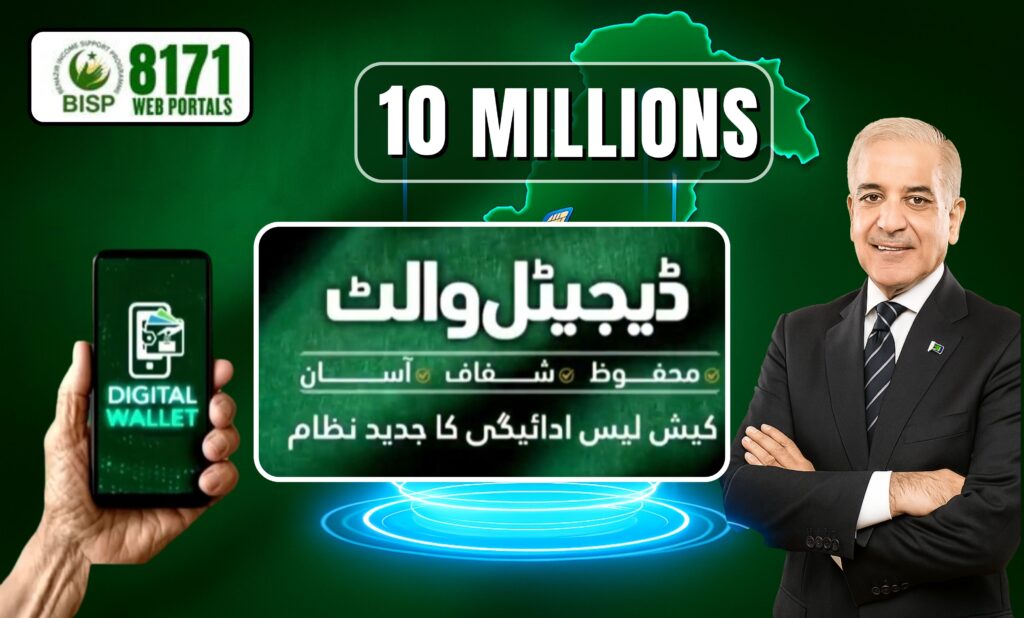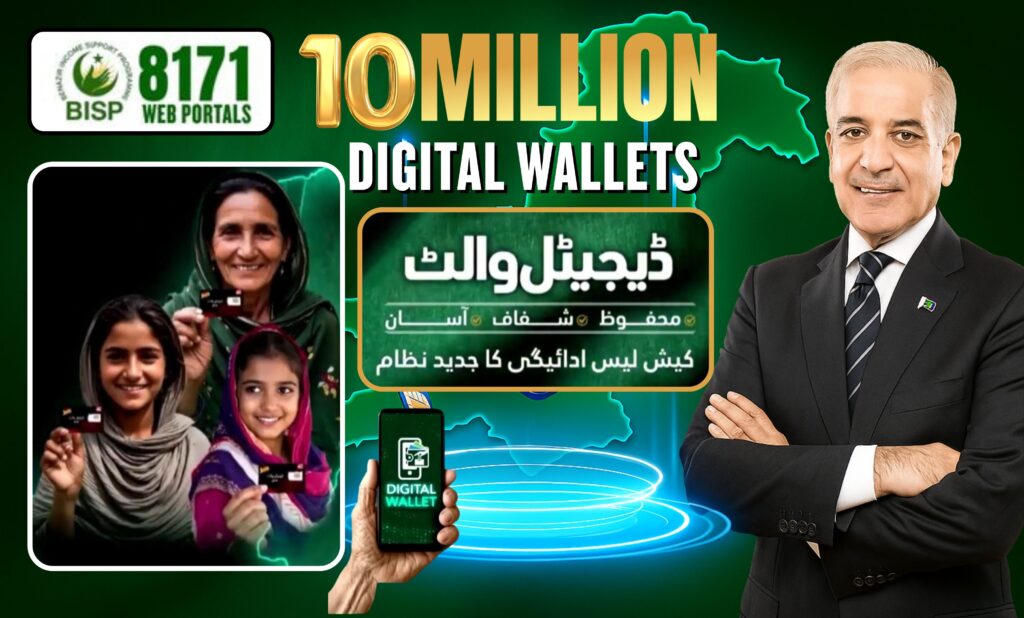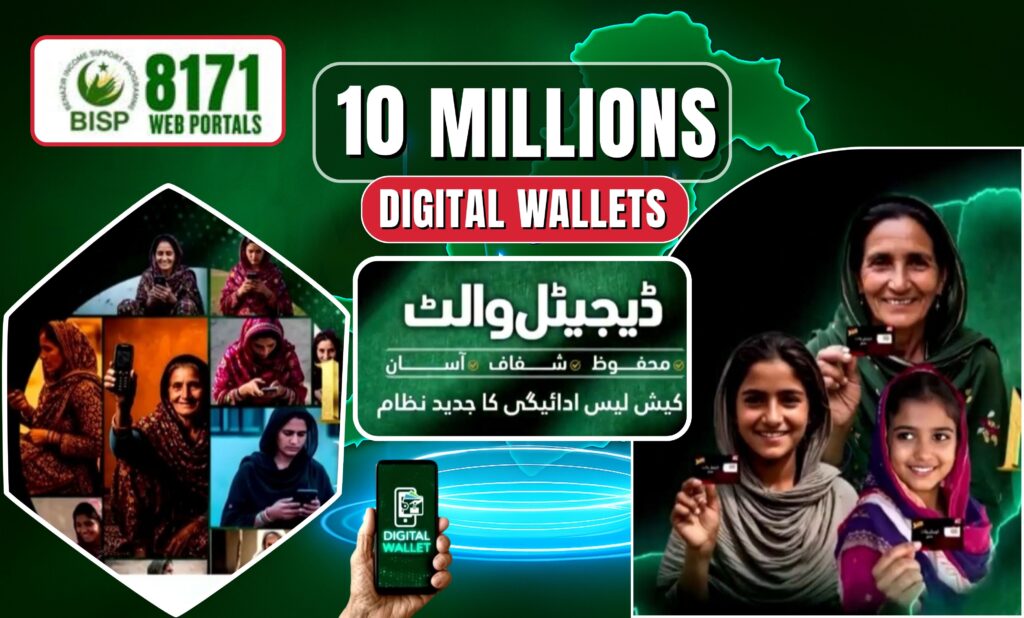In a groundbreaking move that promises to reshape Pakistan’s social protection landscape, Digital Wallets Launched in BISP represent more than just a technological upgrade—they symbolize a fundamental shift towards transparency, financial inclusion, and economic empowerment for millions of vulnerable families.
On August 25, 2025, Prime Minister Shehbaz Sharif officially launched 10 million digital wallets for Benazir Income Support Programme (BISP) beneficiaries, marking what many experts are calling the most significant digital transformation in Pakistan’s welfare system. This initiative doesn’t just modernize payment methods; it creates a foundation for a cashless economy while ensuring that financial aid reaches the most deserving families without intermediaries or corruption.
The launch of digital wallets in BISP addresses longstanding challenges that have plagued traditional cash-based distribution systems, including delays, security risks, and opportunities for misuse. With biometric verification and CNIC-based authentication, this system promises unprecedented transparency and accountability in social protection delivery.
Table of Contents
Understanding BISP’s Digital Revolution
What Are Digital Wallets in BISP Context?
The Digital Wallets Launched in BISP function as secure, mobile-based financial accounts that allow beneficiaries to receive, store, and transfer their support payments directly through their mobile phones. Unlike traditional payment methods that required physical presence at designated centers, these digital wallets provide 24/7 access to funds from anywhere with mobile connectivity.
Key features of BISP digital wallets include:
- Biometric Authentication: Each transaction requires fingerprint verification
- CNIC Integration: Seamless connection with national identity database
- Real-time Notifications: Instant SMS alerts for all transactions
- Zero Deduction Policy: Complete payment amounts reach beneficiaries
- Multi-language Support: Available in Urdu, English, and regional languages
The Technology Behind the Transformation
The digital wallet system leverages Pakistan’s existing mobile money infrastructure, built on the RAAST payment system developed by the State Bank of Pakistan. This integration ensures interoperability with existing financial services while maintaining the highest security standards.
The system architecture includes:
- Mobile Wallet Platform: Powered by partner telecom operators
- Biometric Verification System: Connected to NADRA database
- Payment Gateway: Integrated with banking networks
- Monitoring Dashboard: Real-time tracking and analytics
- Customer Support System: Multi-channel assistance for users

Impact Assessment: Transforming Lives Through Technology
Immediate Benefits for Beneficiaries
The launch of digital wallets in BISP creates immediate, tangible benefits for the 10 million families enrolled in the program:
Financial Security: Eliminating cash handling reduces theft risks and ensures complete payment amounts reach beneficiaries without deductions. Previously, beneficiaries often faced unofficial charges or “commissions” when collecting payments through traditional methods.
Time Savings: No more traveling to payment centers or waiting in long queues. Beneficiaries can access their funds instantly through their mobile phones, saving both time and transportation costs.
Privacy Protection: Digital transactions maintain beneficiary privacy, eliminating public queues that often exposed recipients to social stigma or discrimination.
Financial Literacy: The digital system naturally encourages basic financial literacy as users learn to navigate mobile banking interfaces and understand digital transaction records.
Economic Implications at National Level
The broader economic impact of digital wallets launched in BISP extends far beyond individual beneficiaries:
| Impact Area | Traditional System | Digital Wallet System | Improvement |
|---|---|---|---|
| Payment Processing Time | 7-15 days | Instant | 95% faster |
| Administrative Costs | Rs. 50-100 per transaction | Rs. 5-10 per transaction | 85% reduction |
| Financial Inclusion | Limited | High | 10M+ new digital users |
| Data Collection | Manual, error-prone | Automated, accurate | Real-time insights |
| Fraud Prevention | Difficult to monitor | Comprehensive tracking | 90% fraud reduction |
Social Transformation Through Digital Access
The digital wallets launched in BISP represent more than financial infrastructure—they’re catalysts for social change. Women, who comprise the majority of BISP beneficiaries, gain unprecedented financial autonomy through direct access to digital payments.
Rural communities, often isolated from formal banking networks, suddenly find themselves connected to the national financial ecosystem. This connectivity opens doors to additional financial services, including savings accounts, micro-loans, and insurance products.

Implementation Challenges and Solutions
Addressing Digital Literacy Gaps
One of the most significant challenges in implementing digital wallets launched in BISP involves ensuring that beneficiaries can effectively use the new system. Many recipients have limited experience with mobile technology or digital financial services.
Training Programs: BISP has initiated comprehensive training programs in partnership with local NGOs and community organizations. These programs focus on:
- Basic mobile phone operation
- Digital wallet navigation
- Security best practices
- Problem-solving skills
Simplified Interface Design: The digital wallet interface has been specifically designed for users with minimal digital literacy, featuring:
- Large, clear buttons and text
- Voice prompts in local languages
- Step-by-step guided transactions
- Visual indicators for all actions
Infrastructure and Connectivity Solutions
Pakistan’s varied geography and infrastructure quality present unique challenges for digital wallet implementation:
Mobile Network Coverage: Partnership agreements with all major telecom operators ensure coverage even in remote areas. Where network coverage is limited, offline transaction capabilities allow users to complete transactions when connectivity is restored.
Device Accessibility: The system works on basic feature phones as well as smartphones, ensuring no beneficiary is excluded due to device limitations. Free SIM cards are distributed to beneficiaries who don’t have mobile connections.
Power and Charging Solutions: Solar charging stations and mobile charging services are being established in remote areas to address power supply challenges.
Security Framework: Protecting Vulnerable Populations
Multi-Layer Security Architecture
The security framework for digital wallets launched in BISP employs multiple layers of protection:
Biometric Authentication: Every transaction requires fingerprint verification, making unauthorized access virtually impossible. This system connects directly to NADRA’s database for real-time verification.
Encryption Standards: All data transmission uses bank-level encryption protocols, ensuring that personal and financial information remains secure during transmission and storage.
Transaction Monitoring: AI-powered systems monitor transaction patterns in real-time, automatically flagging suspicious activities for investigation.
Recovery Mechanisms: Robust account recovery procedures ensure beneficiaries can regain access to their funds even if they lose their mobile devices or forget their credentials.
Privacy Protection Measures
Recognizing the sensitive nature of social protection data, the system implements comprehensive privacy safeguards:
- Minimal data collection principles
- Regular privacy audits
- Beneficiary consent for all data uses
- Transparent data sharing policies
- Right to data deletion and correction
Future Roadmap: Expanding Digital Inclusion
Integration with Broader Financial Services
The digital wallets launched in BISP serve as a gateway to comprehensive financial inclusion. Future plans include:
Savings Products: Integration with formal banking institutions to offer savings accounts with competitive interest rates for BISP beneficiaries.
Micro-Credit Facilities: Leveraging transaction history and digital identity to provide micro-loans for income-generating activities.
Insurance Services: Offering micro-insurance products including health, life, and crop insurance through the digital wallet platform.
Investment Opportunities: Simple investment products designed for low-income families to build long-term financial security.
Expansion Beyond BISP
The success of digital wallets in BISP creates a foundation for expanding digital payments across other government programs:
- Ehsaas Education Stipends
- Health Insurance Payments
- Agricultural Support Schemes
- Senior Citizen Support Programs
- Disability Support Payments

Comparative Analysis: Pakistan’s Position in Digital Social Protection
Regional Comparison
Pakistan’s implementation of digital wallets launched in BISP places it among regional leaders in digital social protection:
India’s JAM Trinity: While India’s combination of Jan Dhan accounts, Aadhaar, and mobile connectivity provided inspiration, Pakistan’s BISP system offers more integrated biometric verification and mobile-first design.
Bangladesh’s bKash Integration: Pakistan’s approach offers better security through biometric authentication, while Bangladesh’s system focuses primarily on mobile money transfers.
Indonesia’s Bansos Digital: Pakistan’s system provides more comprehensive financial services integration compared to Indonesia’s more limited digital payment approach.
Global Best Practices Integration
The BISP digital wallet system incorporates international best practices:
- Know Your Customer (KYC) compliance standards
- Anti-Money Laundering (AML) protocols
- Financial Action Task Force (FATF) recommendations
- World Bank Digital ID guidelines
- International Telecommunications Union (ITU) security standards
Economic Multiplier Effects
Stimulating Digital Economy Growth
The digital wallets launched in BISP create ripple effects throughout Pakistan’s economy:
Merchant Network Expansion: As beneficiaries become comfortable with digital payments, local merchants increasingly adopt digital payment acceptance, expanding the formal economy.
Data-Driven Insights: Transaction data provides valuable insights into spending patterns, helping policymakers design more effective poverty reduction strategies.
Financial Service Innovation: Competition among financial service providers intensifies as they compete for newly digitized customers, leading to better products and services.
Small Business Impact
Local businesses experience significant benefits from the digital wallet system:
- Reduced cash handling costs
- Lower theft risks
- Automated transaction records
- Access to digital lending products
- Integration with supply chain financing
Overcoming Cultural and Social Barriers
Building Trust in Digital Systems
Success of digital wallets launched in BISP depends significantly on building trust among beneficiaries who may be skeptical of digital financial services:
Community Champions: Training local respected figures to become digital wallet advocates helps build confidence in the system.
Demonstration Programs: Public demonstrations of wallet functionality help demystify the technology and showcase benefits.
Success Stories: Sharing stories of beneficiaries who have successfully used digital wallets encourages adoption among hesitant users.
Addressing Gender-Specific Challenges
Women beneficiaries face unique challenges in adopting digital financial services:
Mobile Phone Access: Ensuring women have personal access to mobile phones rather than sharing family devices.
Financial Autonomy: Education programs emphasize women’s rights to control their financial resources.
Safety Training: Special focus on digital security helps women protect their financial assets from potential exploitation.

Monitoring and Evaluation Framework
Key Performance Indicators
The success of digital wallets launched in BISP is measured through comprehensive metrics:
Adoption Rates: Percentage of beneficiaries actively using digital wallets within specified timeframes.
Transaction Success Rates: Proportion of completed transactions without technical failures or security issues.
Cost Efficiency: Reduction in administrative costs per payment compared to traditional methods.
Beneficiary Satisfaction: Regular surveys measuring user experience and satisfaction levels.
Financial Inclusion Impact: Measurement of beneficiaries accessing additional financial services.
Continuous Improvement Process
Regular system updates and improvements are implemented based on:
- User feedback collection and analysis
- Technical performance monitoring
- Security assessment updates
- International best practice integration
- Policy environment changes
Call to Action: Embracing Pakistan’s Digital Future
The launch of digital wallets in BISP represents more than a technological upgrade—it’s a transformative step toward Pakistan’s digital future. As we witness this historic moment, it’s crucial that all stakeholders—government officials, civil society organizations, technology partners, and citizens—actively support and contribute to this transformation.
For Beneficiaries: Embrace this opportunity to gain greater financial control and security. Participate in training programs, learn to use these tools effectively, and help others in your community understand the benefits.
For Community Leaders: Become advocates for digital financial inclusion in your communities. Help bridge the gap between traditional practices and modern financial tools.
For Technology Partners: Continue innovating to make digital financial services more accessible, secure, and user-friendly for Pakistan’s most vulnerable populations.
For Policymakers: Build upon this success by expanding digital inclusion initiatives across other government programs and creating an enabling regulatory environment for fintech innovation.
Share your thoughts on how digital wallets launched in BISP can further transform Pakistan’s social protection landscape. Join the conversation about building a more inclusive, transparent, and efficient welfare system for all Pakistanis.
Conclusion
The Digital Wallets Launched in BISP mark a revolutionary transformation in Pakistan’s approach to social protection and financial inclusion. This historic initiative, benefiting 10 million families, represents more than technological advancement—it embodies a commitment to transparency, efficiency, and dignity in welfare delivery.
By eliminating intermediaries, ensuring secure transactions, and providing 24/7 access to funds, these digital wallets empower Pakistan’s most vulnerable populations with unprecedented financial autonomy. As this system continues to evolve and expand, it establishes Pakistan as a regional leader in digital social protection, creating a foundation for broader economic inclusion and sustainable poverty reduction across the nation.
Frequently Asked Questions (FAQs)
1. What is the BISP payment for September 2025? The BISP payment for September 2025 is Rs. 13,500 per eligible family, distributed quarterly through the new digital wallet system.
2. How are BISP payments verified? BISP payments are verified through biometric authentication using fingerprint scanning connected to the NADRA database and CNIC verification.
3. How do I check my 8171 balance online by CNIC? You can check your 8171 balance by visiting the official BISP web portal, entering your CNIC number, or sending an SMS to 8171.
4. How do I check my Ehsaas income? Check your Ehsaas income status through the 8171 web portal by entering your CNIC number or visiting your nearest BISP tehsil office.
5. How to receive BISP payment? Receive BISP payments through your digital wallet using your mobile phone, biometric verification, and CNIC authentication at authorized payment points.

2 thoughts on “Digital Wallets Launched in BISP 10 Million Beneficiaries Get Financial Freedom”